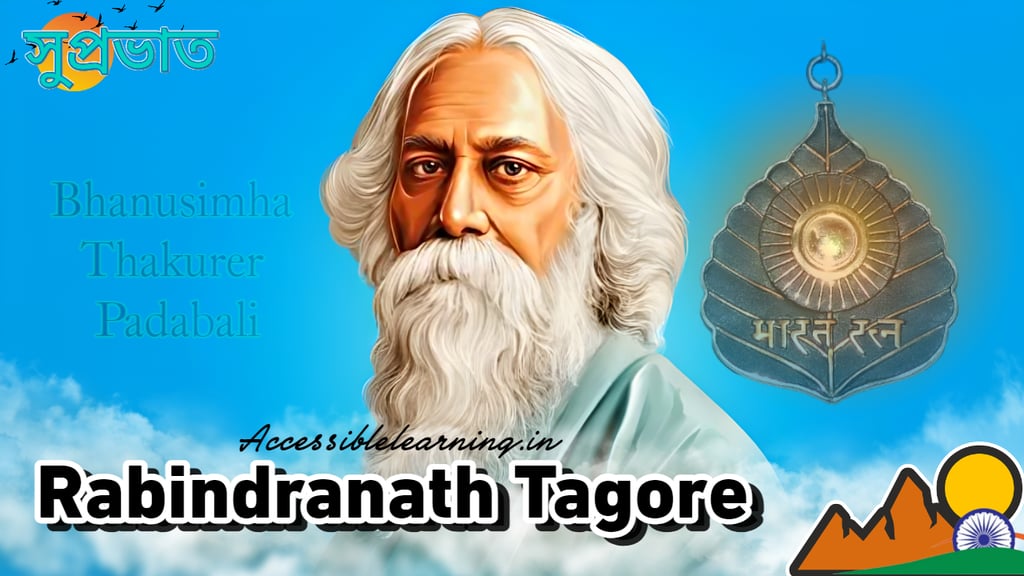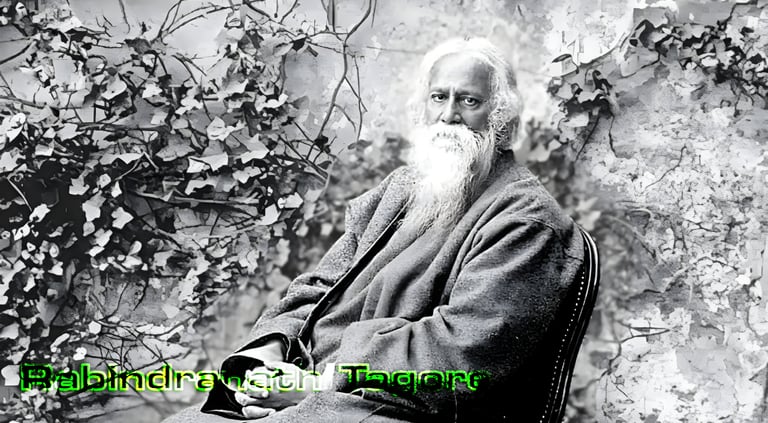
Rabindranath Tagore: The Renaissance Man of India!
Explore the life and legacy of Rabindranath Tagore Ji, the Nobel Prize-winning poet, composer and visionary who reshaped Indian literature, music and education. Explore his profound impact on global culture and his lasting influence on humanism and creativity!
BIOGRAPHY/HISTORYEDUCATION/KNOWLEDGEWRITER/POETBIOGRAPHYINDIA/BHARAT
Sachin K Chaurasiya
9/1/20245 min read


Rabindranath Tagore Ji (रवींद्रनाथ टैगोर जी), born on May 7, 1861, in the cultural hub of Kolkata, India, was a polymath who redefined literature, music, and art in India and beyond. Known as the Bard of Bengal, Tagore's contributions to the world were multifaceted—he was a poet, novelist, musician, playwright, essayist, painter, and philosopher. His profound influence on Bengali culture, Indian nationalism, and global humanism earned him the Nobel Prize in Literature in 1913, making him the first non-European to receive this prestigious honor. This article delves into the life and legacy of Rabindranath Tagore Ji, exploring his contributions and the lasting impact he has had on the world.
Early Life and Influences!
Rabindranath Tagore Ji was born into a prominent and affluent Bengali family known for its contributions to religion, arts, and culture. His father, Debendranath Tagore, was a leading figure in the Brahmo Samaj (ब्रह्मोसमाज), a reformist religious movement that sought to modernize Hinduism and reject the rigidities of caste and superstition. Growing up in such a stimulating environment, Tagore was exposed to various cultural, spiritual, and intellectual influences from a young age.
Despite being largely homeschooled, Tagore’s education was eclectic and broad. He was deeply influenced by classical Sanskrit literature, Bengali folk traditions, and the works of English poets such as Shakespeare and Shelley. This blend of Eastern and Western thought became a hallmark of his literary style, allowing him to create works that resonated with audiences across cultural boundaries.
Literary Contributions
Rabindranath Tagore Ji’s literary output is vast and varied, encompassing over 50 volumes of poetry, numerous novels, short stories, plays, essays, and songs. His works are characterized by their lyrical beauty, deep philosophical insights, and a profound connection to nature and spirituality.
Poetry: Tagore's poems are renowned for their lyrical beauty and depth of emotion. His most famous collection, Gitanjali (Song Offerings), earned him the Nobel Prize in Literature. The poems in Gitanjali explore themes of divine love, human connection, and the quest for spiritual wisdom. The simplicity and universality of his poems have touched the hearts of readers around the world.
Novels and short stories: Tagore was also a skilled storyteller, weaving complex human emotions and social issues into his stories. His novel Ghare-Baire (Home and World) examines the tension between tradition and modernity, personal desires and political ideals during the Indian Independence Movement. Chokher Bali (A Grain of Sand) deals with issues of marriage, widowhood, and the complexities of human relationships, demonstrating Tagore's keen understanding of human psychology.
Plays and essays: As a playwright, Tagore wrote plays that combined traditional Indian forms with modern themes, often addressing social issues such as caste discrimination and women's rights. His essays cover a wide range of topics, from education and politics to art and philosophy, reflecting his intellectual curiosity and commitment to social reform.


Music and Rabindra Sangeet!
Rabindranath Tagore Ji's contribution to music is as significant as his literary achievements. He composed over 2,000 songs, collectively known as Rabindra Sangeet, which are an integral part of Bengali culture. Characterized by their melodious melodies and poignant lyrics, these songs are inspired by classical Indian music, folk traditions, and Western influences.
They cover a wide range of emotions and themes, from devotional hymns and love songs to patriotic songs. Two of Tagore's compositions hold a special place in history: "Jana Gana Mana," the national anthem of India, and "Amar Sonar Bangla," the national anthem of Bangladesh. These songs embody the spirit of their respective countries and continue to inspire millions.
Art and Visual Creativit!
In addition to his literary and musical talents, Tagore was also a painter, beginning his artistic journey late in life, in his 60s. His paintings are notable for their abstract and avant-garde style, often depicting human figures and faces with a sinister, otherworldly quality. His use of bold, unconventional forms and colors set him apart from the traditional art of his time, contributing to the development of modern Indian art.
Tagore's visual art, just like his literature, was a reflection of his inner world—his thoughts, feelings, and philosophy. He saw art as a means of self-expression and a way to transcend the limitations of language, leading to a deeper, more intuitive understanding of the world.
Educational Reforms and Visva-Bharati University
Rabindranath Tagore Ji’s vision for education was revolutionary. He believed in an education system that was holistic, fostering creativity, critical thinking, and a deep connection with nature. In 1921, he founded Visva-Bharati University in Santiniketan, West Bengal. This institution was conceived as a center for the blending of Eastern and Western educational traditions, emphasizing a learning environment free from the constraints of traditional rote learning.
Visva-Bharati became a melting pot of cultures, attracting scholars, artists, and students from around the world. Tagore’s educational philosophy was rooted in the belief that education should nurture the individual’s creativity and humanity rather than simply imparting knowledge. His approach to education was deeply connected to his broader vision of a world where people live in harmony with each other and with nature.
Political Views and Humanism!
Although Tagore was a staunch supporter of Indian independence, his views on nationalism were complex and often diverged from those of the mainstream nationalist movement. He was critical of aggressive nationalism, which in his view led to division and conflict. In his essay Nationalism, Tagore warned against the dangers of ultra-nationalism and called for a more inclusive, humanistic approach to the world's problems.
Tagore's philosophy was rooted in the idea of universalism – he believed in the unity of all human beings, transcending borders, races and religions. This vision of global harmony was reflected in his advocacy of internationalism and his efforts to promote cultural exchange and mutual understanding among nations.


Legacy and Enduring Influence!
Rabindranath Tagore Ji passed away on August 7, 1941, but his legacy continues to resonate across the world. His contributions to literature, music, art, and education have left an indelible mark on Indian culture and beyond. Tagore’s works are studied and celebrated not only in India but also in countries as diverse as Japan, Argentina, and the United States.
Tagore’s influence extends beyond his artistic and intellectual contributions. His ideals of universalism, humanism, and the pursuit of spiritual and intellectual freedom continue to inspire movements for social and political change. The institutions he founded, the songs he composed, and the literature he wrote all reflect his deep commitment to the betterment of humanity.
Rabindranath Tagore Ji was more than just a poet or a composer; he was a visionary who sought to unite the world through his art, philosophy, and education. His life and work exemplify the power of creativity, the importance of cultural exchange, and the enduring value of humanism. As we look back on his contributions, we are reminded of the timeless relevance of his message: that the pursuit of knowledge, beauty, and harmony is the highest aspiration of human life.
Tagore’s legacy is a testament to the idea that true greatness lies not in the accolades one receives but in the lasting impact one has on the hearts and minds of people across generations and borders. His life and work continue to inspire us to dream, to create, and to strive for a better world.
Subscribe to our newsletter
All © Copyright reserved by Accessible-Learning
| Terms & Conditions
Knowledge is power. Learn with Us. 📚


